Every step you take
Kashgar, China -- You expect to have problems when reporting on sensitive stories in China. People following you, thugs blocking your way, obstacles springing up in the most innocuous of places -- it shocks you at first but eventually you get used to things like that. It comes with the territory.
But when we went to the region of Xinjiang a few months back, it was a whole other level -- surreal, sinister and sometimes comical all rolled into one.
Xinjiang is a region in northwestern China that’s home to the Uighurs and other Muslim Turkic-speaking minorities. According to experts and human rights organizations, over the past several years, the government has rounded up an estimated one million of them into re-education camps, saying that it is trying to fight religious extremism.
 This photo taken on May 31, 2019 shows razor wire and security cameras on the wall of a kindergarten in Hotan in China's northwest Xinjiang region. (AFP / Greg Baker)
This photo taken on May 31, 2019 shows razor wire and security cameras on the wall of a kindergarten in Hotan in China's northwest Xinjiang region. (AFP / Greg Baker)I’ve been in China a little over a year, so I’ve gotten used to how journalists operate here. At first, it’s quite a shock.
For one, information is much harder to come by. You don’t have communications managers whom you can just call up for information like you would in my native Australia.
Here, you have to really dig, you have to know where to look and dig through mounds of information in order to get something.
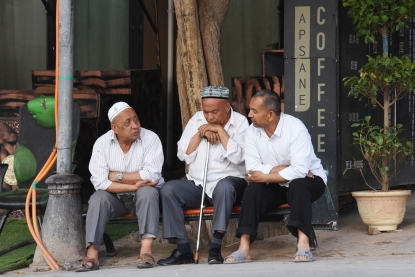 This photo taken on June 4, 2019 shows Uighur men resing in front of a coffee bar in the restored old city area of Kashgar, in China's western Xinjiang region. (AFP / Greg Baker)
This photo taken on June 4, 2019 shows Uighur men resing in front of a coffee bar in the restored old city area of Kashgar, in China's western Xinjiang region. (AFP / Greg Baker) This photo taken on June 3, 2019 shows Uighur men resting in the restored old city area of Kashgar, in China's western Xinjiang region. (AFP / Greg Baker)
This photo taken on June 3, 2019 shows Uighur men resting in the restored old city area of Kashgar, in China's western Xinjiang region. (AFP / Greg Baker)
Then there is access. When you report on sensitive stories, you just expect that there’ll be obstacles.
For example, last year during Boxing Day we were trying to cover a trial of a human rights lawyer. We knew ahead of time that it was happening, so we went to the courthouse to try to get access. The trial was an hour and a half from Beijing, so we left really early to get there first thing when the courthouse opens.
Right away we were surrounded by sketchy looking people. They’re plain-clothes policemen and are a regular occurrence at sensitive stories. Their main aim is to prevent you from getting your story. They’ll step in front of me as I’m trying to get a shot. Sometimes they’ll put a hand in front of my camera.
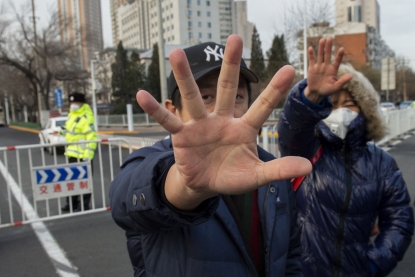 Plainclothes police officers gesture to stop photographs from being taken in front of the number 2 intermediate people's court in Tianjin on December 26, 2018, where the trial of human rights lawyer Wang Quanzhang was set to begin. (AFP / Nicolas Asfouri)
Plainclothes police officers gesture to stop photographs from being taken in front of the number 2 intermediate people's court in Tianjin on December 26, 2018, where the trial of human rights lawyer Wang Quanzhang was set to begin. (AFP / Nicolas Asfouri) Plainclothes police are seen in front of the number 2 intermediate people's court in Tianjin on December 26, 2018, where the trial of human rights lawyer Wang Quanzhang was set to begin. (AFP / Nicolas Asfouri)
Plainclothes police are seen in front of the number 2 intermediate people's court in Tianjin on December 26, 2018, where the trial of human rights lawyer Wang Quanzhang was set to begin. (AFP / Nicolas Asfouri)
That’s what happened here as well. Throughout the day, it just escalated. There was one particular thug who kept blocking me from trying to take a video of the lawyer’s supporter. He just kept pushing me around and eventually a few of his buddies surrounded me and kicked me in the family jewels and forced me to move away.
I’ve learned that it’s no use trying to talk to these guys. They won’t respond. Or they’ll say ‘you bumped into me.’ It’s useless to appeal to uniformed police because they won’t do anything. It’s like everyone is playing a part in a play. Eventually you play your part, too. There is no point in reacting. The more you react, the more it escalates. So you just walk away and try to get your shot elsewhere.
When I first started working here, it was quite shocking. You hear about it of course, but when you experience it for the first time, it’s different. Eventually you just accept that this is how things are here. You find ways to achieve what you need to do without escalating the situation.
 This photo taken on May 30, 2019 shows personnel around a surveillance drone on the runway of the airport in Hotan in China's western Xinjiang region. (AFP / Greg Baker)
This photo taken on May 30, 2019 shows personnel around a surveillance drone on the runway of the airport in Hotan in China's western Xinjiang region. (AFP / Greg Baker)Armed with this knowledge and experience, we headed to Xinjiang in late May few to report on the situation there. Since we took a plane, the authorities knew we were coming.
The moment we landed we felt it. There were suspicious looking people waiting for us outside and they started filming us as soon as we appeared. Wherever we went, cars followed. There were people outside the hotel. At one point, I counted five SUVs following us.
The thing that struck me first when we landed and that kept jumping out during the trip was the massive security presence in the region. I’ve never seen such a heavy and striking police and military presence in China or anywhere else I’ve worked. There were checkpoints everywhere and police were directing traffic at most crossroads, even through they had traffic lights. Stations that are known in China as “civilian police stations” were sprinkled everywhere.
 This photo taken on June 4, 2019 shows a police checkpoint on a road near a facility believed to be a re-education camp where mostly Muslim ethnic minorities are detained, north of Akto in China's western Xinjiang region. (AFP / Greg Baker)
This photo taken on June 4, 2019 shows a police checkpoint on a road near a facility believed to be a re-education camp where mostly Muslim ethnic minorities are detained, north of Akto in China's western Xinjiang region. (AFP / Greg Baker)At each checkpoint, we had to get out of the car, have our passports checked, go through a facial recognition system (which didn’t work because we were foreigners, but still).
There were body scanning machines and machines to scan the cars as they crawled through the lane. I noticed that ethnic Han locals got through the checkpoints fairly quickly, but foreigners and Uighurs had to wait.
The whole region seemed to be draped in propaganda posters -- everywhere you looked, there were national flags and banners. “Love the party,” “Learn Xi Jinping’s thought,” “ethnic unity is important,” “strengthen the love for China.” Again, you get a dose of propaganda posters everywhere in China, but this was really over the top.
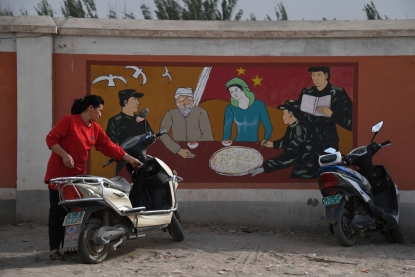 This photo taken on June 2, 2019 shows a Uighur woman beside a propaganda painting showing soldiers meeting with a Uighur family, outside a military hospital near Kashgar in China's northwest Xinjiang region. (AFP / Greg Baker)
This photo taken on June 2, 2019 shows a Uighur woman beside a propaganda painting showing soldiers meeting with a Uighur family, outside a military hospital near Kashgar in China's northwest Xinjiang region. (AFP / Greg Baker) This photo taken on June 2, 2019 shows a propaganda painting depicting a hammer squashing terrorists, on the wall of a military hospital near Kashgar, in China's northwest Xinjiang region. (AFP / Greg Baker)
This photo taken on June 2, 2019 shows a propaganda painting depicting a hammer squashing terrorists, on the wall of a military hospital near Kashgar, in China's northwest Xinjiang region. (AFP / Greg Baker)
The lengths that the security apparatus went to to prevent us from doing our job at times reached almost comical proportions. Take the fake car crash.
One day, we set out to confirm our reporting that there was a re-education camp in the area. We wanted to get footage of it. So we set off early. I guess it was a bit too early, for as we drove along we came upon a somewhat surreal scene of people staging a car crash so that the road could be closed.
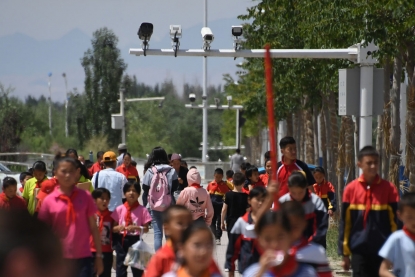 Someone's watching you -- this photo taken on June 4, 2019 shows schoolchildren walking below surveillance cameras in Akto, south of Kashgar, in China's western Xinjiang region. (AFP / Greg Baker)
Someone's watching you -- this photo taken on June 4, 2019 shows schoolchildren walking below surveillance cameras in Akto, south of Kashgar, in China's western Xinjiang region. (AFP / Greg Baker)After we got through one of the regular roadblocks, we saw people edging a tuk tuk truck near a black sedan, centimeter by centimeter, so that they were just touching each other. Once they got them close, the people who moved the truck and the people inside the sedan got out and pretended to start making phone calls. We drove right past them as they did so. We drove ahead and eventually got to a dead end, from where we could see the camp. We filmed for a few minutes, got back in the car and drove back to see if we could find another way in.
When we passed the “car crash” the second time, it had its intended effect -- there were dozens of vehicles stuck there, unable to move. This time we got stuck too. As we crawled by the cars the second time around, we saw that there wasn’t a scratch on either one. Eventually we got through and found another way to get near the camp, in a village.
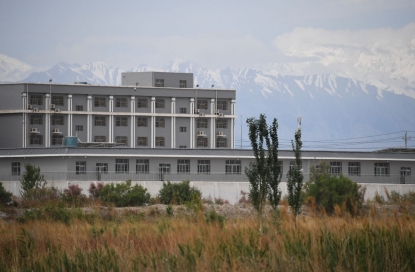 This file photo taken on June 4, 2019 shows a facility believed to be a re-education camp where mostly muslim ethnic minorities are detained, north of Akto in China's northwestern Xinjiang region. (AFP / Greg Baker)
This file photo taken on June 4, 2019 shows a facility believed to be a re-education camp where mostly muslim ethnic minorities are detained, north of Akto in China's northwestern Xinjiang region. (AFP / Greg Baker)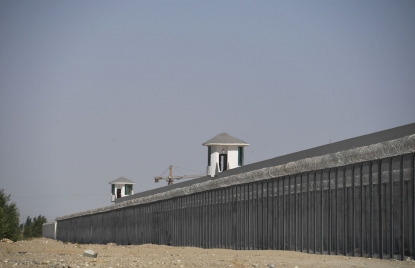 This photo taken on May 31, 2019 shows watchtowers on a high-security facility near what is believed to be a re-education camp where mostly Muslim ethnic minorities are detained, on the outskirts of Hotan, in China's northwestern Xinjiang region. (AFP / Greg Baker)
This photo taken on May 31, 2019 shows watchtowers on a high-security facility near what is believed to be a re-education camp where mostly Muslim ethnic minorities are detained, on the outskirts of Hotan, in China's northwestern Xinjiang region. (AFP / Greg Baker)
As we filmed, all of the sudden a guy appeared with a walkie talkie, wearing black jeans and t-shirt. He ran toward us. “You have to leave for your own safety,” he said hurriedly. “Why should we leave?” we asked. “You have no right to tell us where to go.” But he just kept repeating that we had to leave and just kind of edged us away from the spot where we were filming the camp. He stood in front of my camera and blocked every shot I tried to make. As he did so, another guy appeared on a motorbike.
I kept filming. One of the things that I’ve learned here is that everything is part of the story, so I keep the camera rolling. If they block the shot, that’s part of the story too.
After a few minutes, we left. It was the start of our trip and we didn’t want to jeopardize the rest of it, so we just left, with him following us to make sure.
 The author (left) is being escorted from a village while filming buildings at the Artux City Vocational Skills Education Training Service Center (in rear), believd to be a re-education camp where mostly Muslim ethnic minorities are detained, June 2, 2019.
(AFP / Greg Baker)
The author (left) is being escorted from a village while filming buildings at the Artux City Vocational Skills Education Training Service Center (in rear), believd to be a re-education camp where mostly Muslim ethnic minorities are detained, June 2, 2019.
(AFP / Greg Baker)It was as the security guard escorted us out of the village that we discovered yet another bizarre scheme to keep taps on us -- fake tourists.
Part of the reason that we had driven by the “car crash” earlier than the stagers had expected was because we had been planning to first go to a nearby town. Through satellite imagery, we had discovered that a mosque in that town had been destroyed and we wanted to get a look.
 This photo taken on May 30, 2019 shows a garden where the Gujan Derwaza mosque once stood in Hotan, in China's western Xinjiang region. (AFP / Greg Baker)
This photo taken on May 30, 2019 shows a garden where the Gujan Derwaza mosque once stood in Hotan, in China's western Xinjiang region. (AFP / Greg Baker) This photo taken on May 30, 2019 shows an empty space where the Gulluk Kowruk mosque once stood in Hotan, in China's western Xinjiang region. (AFP / Greg Baker)
This photo taken on May 30, 2019 shows an empty space where the Gulluk Kowruk mosque once stood in Hotan, in China's western Xinjiang region. (AFP / Greg Baker)
But on our way in, we were stopped at one of the roadblocks. “You can’t go further, there’s going to be police drills on the road,” a policeman told us. “How long is it going to last?” “I don’t know.” Just then, a purple van pulled up with two young, trendily-dressed women inside. The police asked them the same questions they asked us. The women said they were teachers and had the day off and were headed to the town to go sight-seeing. It seemed plausible, so we didn’t really give them another thought. Until after we drove past the fake car crash for the second time and got to the village and realized the women had been following us.
“What are you doing,” I asked them once we stopped. “We’re lost, so we were following you,” they said. “Look, I can’t help you. We’re journalists and we’re working and if you follow us, you could put yourselves at risk. And you could put other people at risk.” At that point, I was still more annoyed than anything else. Their story seemed plausible. Until we got escorted out of the village.
The women were still there, in their van. But the security guard that seemed so preoccupied with us being there didn’t so much as glance at them. And when we drove off, the women didn’t follow. That had to have been one of the more bizarre experiences that I’ve had -- having fake pretty tourists tailing us.
Constantly working under conditions like that takes a toll. You learn to deal with it, but it’s mentally exhausting to be constantly battling. It drains you.
But you have to have a sense of humor too. One night in Xinjiang we found ourselves hanging out with some propaganda officials. How is your stay, one of them asked me.
"It’s really good,” I answered. “I actually feel really safe because I have so many people following me.” She didn’t seem amused.
This blog was written with Yana Dlugy in Paris.


